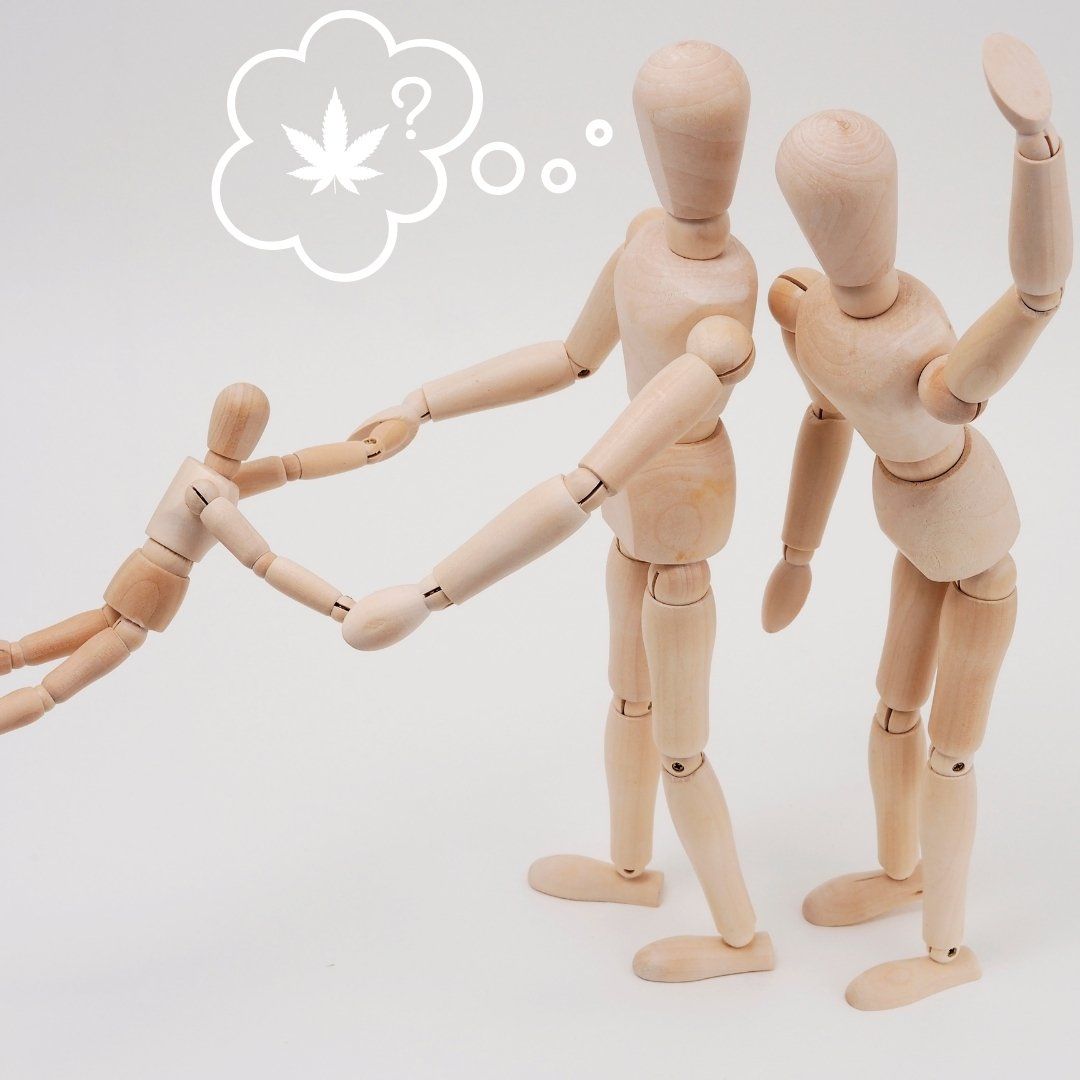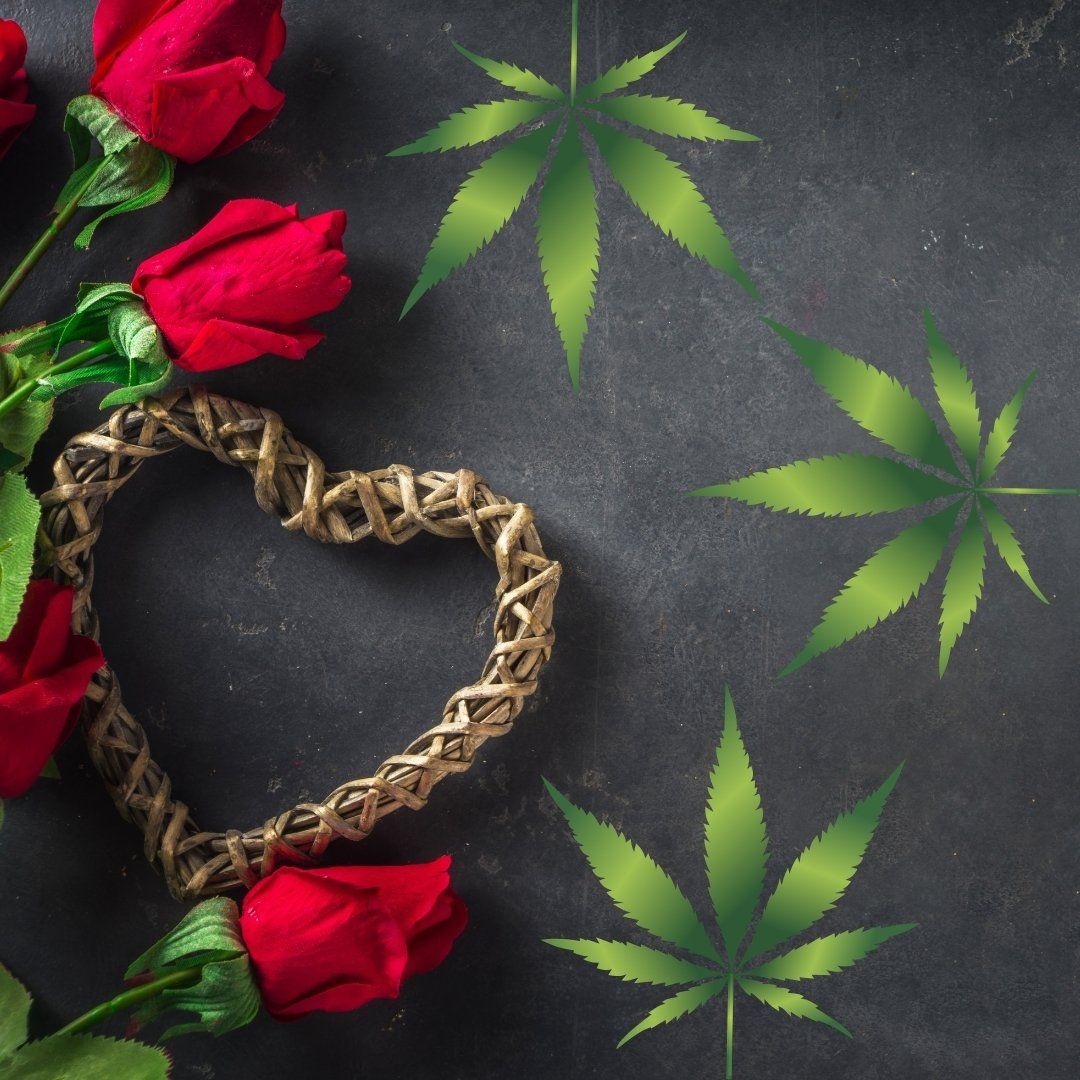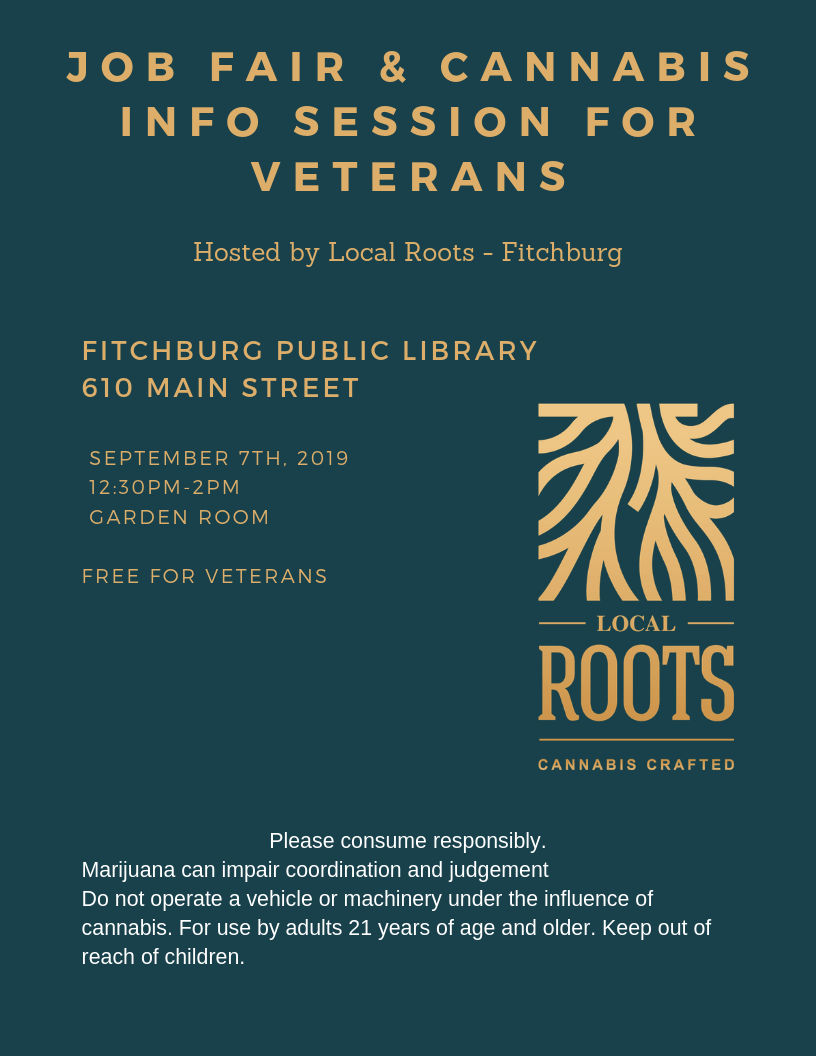Follow Us
Join our newsletter
SIGN UP FOR OUR LOYALTY PROGRAM
Sign Up
FOR WEEKLY UPDATES CRAFTED JUST FOR YOU
Veterans are Disporportionately Impacted by Prohibition
Download Event Flyer
Local Roots is holding a Job Fair and Cannabis Information Session for Fitchburg area veterans on Saturday September 7th. The event will take place in the Garden Room at the Fitchburg Public Library (610 Main St) from 12pm-2:30pm.
Veterans risk their lives to defend the homeland. They are taught to hold the line in the face of danger. They are told no person can hold a candle them: soldier, fighter, pilot, mechanic, frogman, marine, and that if they’re strong, they’ll make it home. Some join for glory, some join for love, some join for a path to their future. And the veterans don’t see the front – they won’t admit that they are the lucky ones. And whether or not they see the banality of war from the inside or from the outside, they do not leave the same as you came. The homeland, their home, even their family, is different now, too.
Adjusting to civilian-life after the military can be a difficult transition. When the recruiters talk about glory, they don’t talk about lack of appreciation. They don’t tell talk about the sacrifices of mind, body, spirit, and friends, and their resounding impact, if you manage to hold on your life.
They don’t let on about the difficulties of the Department of Veterans Affairs. They don’t talk about having a medical condition; their mental or physical losses; the indefinite label as “disabled”; the benefits system and it’s psychological impact.
Recent statistics show that over 20 veterans are lost to suicide each day; an additional 20 are lost to accidental overdose. Individual people finally recognized as a statistic. In Washington State, medical cannabis patients and veterans, Patrick Siefert and Randy Madden, formed the non-profit cannabis activist group, Twenty22Many, to call awareness to their fallen sisters and brothers, support one another, and fight veteran suicide. Patrick had owned a medical collective called Safe Access Point, and he recounts meeting Randy, saying, “He [Randy] wouldn’t even look at me for the first three months”.
Veteran and cannabis activist in Massachusetts, Randy MacAffrie, told Blunt Talk podcast
that while advocating for Question 4 (2016 MA Marijuana Initiative), the VA found him to be “too active” and cut his benefits in half. It’s the age old stigma of mental health and disability at work: if you don’t look or act disabled, you must not be. Randy was able to get his benefits back (with haste, with the help of Senator Warren); he tells his story to exemplify one of the dozens of reasons veterans stay quiet about their cannabis use.
Approximately, 1 in 5 veterans have used cannabis in the last month, and 1 in 4 veterans support medical cannabis. In contrast, VA physicians are often in the dark on their patients cannabis use and how cannabis might interact with the other drug they’re prescribing their patients – and they are legally bound not to recommend cannabis treatments. While the VA wants their patients to talk about their cannabis use, veterans fear the backlash will affect their benefits, the ability to get a home loan, and other important areas of their lives. There is legislature being proposed and debated right now that argues for equal access for vets and would allow the VA to research the impact and effects of medical cannabis on a variety of conditions.
“Helping veterans…really is a trickle down effect,” said Randy MacAffrie, referring to political leaders who recognize the need for medical cannabis access and recognition for veterans. He says it helps the entire community. “When you’re able to help those who have risked their lives for it, they have families in those communities, those families have friends…” said Randy. Veterans are one of most diverse demographics in the country, and cannabis legalization transcends political parties and other cultural binaries. “Being able to unite around veterans just makes sense,” he said.

By Nakiesha Jordan
•
March 15, 2021
Starting off new to cannabis use can be intimidating with so many new terms to learn. Cannabinoids, terpenes, Endocannabinoid System, and more can appear confusing or complex but there is no reason to feel overwhelmed! This blog will break down some of the common cannabis terms so that you can use this knowledge to feel more empowered when selecting cannabis products! In order to understand the foundation of common cannabis terms you will first need to know what the Endocannabinoid System is. The Endocannabinoid System is a complex cell signaling system that regulates body functions such as homeostasis, your nervous system, and your immune system. The Endocannabinoid System also produces the runner’s high. The Endocannabinoid System involves endocannabinoids, receptors, and enzymes that help your body to function properly. The main endocannabinoid receptors are CB1 and CB2 receptors. CB1 receptors are found predominantly in your Central Nervous System where as CB2 receptors are found in your Peripheral Nervous System. Enzymes are useful for breaking down endocannabinoids once they have fulfilled their purpose. Now that you know a bit about the Endocannabinoid System let’s discuss how cannabinoids such as THC and CBD interact with it! Cannabinoids are the compounds within the cannabis plant that produce effects within the body by interacting with endocannabinoid receptors. Cannabinoids can regulate how cells communicate by directing how they send, receive, or translate their functions. Some common cannabinoids include CBN, CBG, CBC, THCV, CBD, and THC. THC, otherwise known as Tetrahydrocannabinol, is the most common psychoactive cannabinoid within the cannabis plant. It is the cannabinoid that interacts with the Endocannabinoid System producing a feeling of being euphorically high. CBD, known also as Cannabidiol, is the non-psychoactive cannabinoid within the cannabis plant that may offer therapeutic benefits. CBD can block out THC from interacting with endocannabinoid receptors when taken in larger amounts than THC which may help lessen its effects. When THC and CBD are taken in equal amounts the effects of THC are heightened and may produce a more balanced and pleasurable high. TAC is another acronym that is seen on a dispensary’s menu. TAC is Total Active Cannabinoids. It measures the potency of the product through adding the amounts of the cannabinoids, terpenes, and other compounds present within it. What are Terpenes you ask? Terpenes are the aromatic compound of the cannabis plant. Terpenes are what gives each cannabis strain its own unique taste, smell, and effects. Terpenes are known to possibly provide therapeutic effects. Terpenes are oftentimes more important than a high THC content when choosing the affects you wish to experience. When terpenes and cannabinoids work synergistically together to create many unique benefits and effects caused by the full spectrum aspect within a product it is called the Entourage Effect. Terpenes and cannabinoids each have different boiling points. The different temperatures when heating cannabis flower or oil causes different terpenes and or cannabinoids to be more bioavailable for your body. When in doubt about what temperature to use always opt for a lower temperature setting. There are three different strains that cannabis can be categorized in. Cannabis Sativa, Cannabis Indica, and Cannabis Ruderalis (Hybrid). Cannabis Sativa plants tend to have longer leaves and grow in warmer climates. The effects of Sativa strains may be energizing, uplifting, and may have more cerebral effects. Indica strains tend to have shorter leaves and grow in cold climates. Indica strains may produce sleepy and more body focused effects. Hybrid strains are the combination of Indica and Sativa strains and may have more balanced, relaxing, and or creative effects. Some other terms you may see or hear in a dispensary tend to be in regard to products. Cannabis flower is the bud of the cannabis plant, pre-rolls are cannabis filled cigarettes, topicals are cannabis infused lotions and body care items, and edibles are cannabis infused food, drinks, capsules, or oils. Some terms you may not be familiar with are chillums and concentrates. Chillums are glass pipe pieces that can come pre-packed with flower. Cannabis concentrates are extracted THC products that are intended to be smoked or vaporized. Concentrates come in different textures and are often very potent. They can be smoked sandwiched in between flower or vaporized in a dab rig or concentrate vaporizer pen. Cannabis concentrates, like cannabis flower, can be decarboxylated to make your own edibles! Many people start with vape cartridges before moving to concentrates, however there are a few that are less potent. Kief, moonrocks, and hash rosin are great when transitioning to trying concentrates. Kief is the extracted trichomes from the cannabis plant and can be sprinkled and smoked on top of flower. Moonrocks are cannabis flower rolled in cannabis oil and kief and can be smoked with flower. Avoid placing your moonrock in a grinder! Now that you know a bit about some of the common terms used within the cannabis industry you can share your knowledge with others or use it to discover the best products for you! If you still have questions don’t be shy to reach out to your budtender when you are placing your order. We are always here to help!

By Nakiesha Jordan
•
February 28, 2021
Cannabis may help improve various aspects of your life however even today cannabis users can face stigmas, especially when it comes to parenting. Too often the myth of the lazy cannabis user is utilized to judge and stereotype and can be hurtful to those it is targeted at. Today we will analyze this myth and ways that cannabis using parents can combat it! The myth of the lazy stoner came about shortly after the 1937 Marijuana Tax Act which criminalized all but industrial use of cannabis. Racism and prejudice created an association between immigrants and cannabis use creating negative stereotypes. These stereotypes were furthered by the War on Drugs in the 1970’s which repealed the Marijuana Tax Act claiming that cannabis held no medicinal value. Cannabis has a long history of being used for therapeutic and recreational purposes dating as far back as 500 BCE in places such as China and Siberia. In the United States during the 1800’s various different cannabis extracts were commonly sold in pharmacies and prescribed to those looking for symptom relief by doctors. Today parents struggling with chronic illnesses often turn to cannabis use to help improve their quality of life. Due to being able to find symptom relief, parents who use cannabis are able to better enjoy their time with their children and can be more attentive to them. Cannabis may be able to help parents be able to engage in more activities and keep up with the physical demands of parenting, proving the lazy stoner stereotype is just a myth! Knowing why the stereotypes exist is one thing but figuring out how to handle explaining to other people or even your children can be a difficult situation. Using cannabis is a private matter, so you should not feel pushed to have to divulge this information. Talking to your children about cannabis can help prepare them for comments or misinformation that they may encounter in the outside world. Explaining to them about cannabis safety such as not touching your cannabis products may help avoid unwanted situations. Explain to your children that cannabis use is for adults 21 years or older and that for young children with developing brains it is not a safe product for them to consume. As an adult you should always keep your cannabis stored properly and locked up out of reach! Avoid smoking in your home as cannabis smoke can be harmful for children. Make sure there is someone to care for your children for you while you are consuming cannabis and do not use cannabis products when you are planning to drive. Marijuana products can be mistake for food or candy by children, so make sure to store them out of sight. If a child consumes cannabis products call the poison control hotline or bring them to the emergency room. Communicating with your loved ones about cannabis can help bring the family together and develop stronger bonds through honesty and openness. A recent study shows that 1 in 8 people in the United States use cannabis, so maybe more adults than you know consume cannabis! If cannabis helps you be a better parent to your children, then ignore the stigma and just enjoy life’s precious memories!

By Nakiesha Jordan
•
February 10, 2021
Valentine’s day is quickly approaching and you’re unsure of what to buy for the cannabis lover that you love? No worries, we got you covered! Here are some Valentine’s Day gift ideas just for you. Edibles are an excellent option for gift giving as they don’t require any accessories to consume! From chocolates to gummies, oil applicators, tinctures, capsules, and hard candies, the options are endless as to what you can choose. With so many options, where do you begin? Start by thinking about the lifestyle of the person you are purchasing for. Do they have dietary restrictions? Are they new to using edibles? If your cannabis lover is new to edibles it is always best to buy an edible with a lower potency per piece. Remember the advice of start low and go slow as this will help prevent the over consumption of THC edibles. Edibles will take around 2 hours to digest and may last 4-12 hours. Most edibles will have an easy to distinguish 1-5mg serving size. This may be a great starting dose for a beginner. You may want to avoid making your own edibles for you or your lover’s first edible experience, but if you do cook with cannabis oil make sure to know how much THC will be in each serving so that you can inform your loved one. Ask your budtender for recommendations and educational handouts on edibles that you can include alongside your gift! If you are in the romantic mood you can gift a topical to your lover. Massage oils, salves, lotions, patches, and intimate lubricants are all great for getting closer with your partner. The effects of the topical may provide localized relief within moments and may last for 4-12 hours depending on the type of topical used. Most topicals will not produce a psychoactive high but make sure to ask your budtender if the one you are purchasing may produce the effects you are looking for. Topicals may help ease sore muscles and may provide body relaxation so you can recover from your passionate night! Another great option would be pre-rolls! Pre-rolls are a convenient way to get high and are small enough to fit in almost any gift bag! Want something new to add with your gift? Try a chillum! The chillums we currently sell are reusable glass pipe pieces that come pre-packed with a small amount of flower. It’s a great way to try a new strain or for a quick smoke session before your Valentine’s Day dinner date. Smoking brings feelings of nostalgia but what if you want to gift a more discreet option? If this is the case then vape cartridges may be what you’re looking for! Vapes offer a portable and smell less option for a date that is on the go. Like almost any smoking consumption method the effects are nearly immediate and may last for a few hours. Due to the higher potency of vape cartridges euphoria and bliss may be inevitable and some strains may act as an aphrodisiac. Need something stronger? Ask your budtender for recommendations on concentrates! If you are still unsure of what would be a perfect gift for your loved one or for yourself please reach out to us! We are here to answer your questions and help guide you towards the best cannabis experience possible. If you are interested we currently have a Valentine's Day Bundle that is available for a limited amount of time! You can find it on our online menu through the link below!

Please Consume Responsibly
For use only by adults 21 years of age or older. Keep out of reach of children. Marijuana should not be used by women who are pregnant or breastfeeding.
LocalRoots.cc
© 2025
© 2025
All Rights Reserved | LocalRoots.cc

